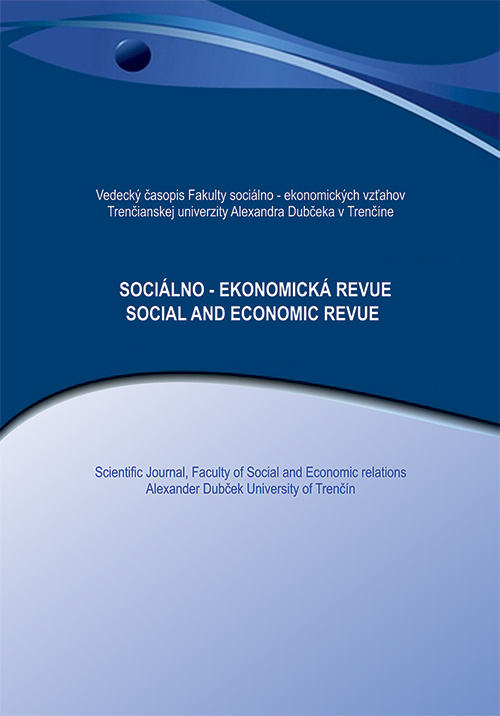UNEMPLOYMENT OF PEOPLE WITH DISABILITIES IN SLOVAK REPUBLIC
Being able to work and have a job is very important for everyone. This is especially important for people with disabilities. Some of these people are able to work at least part-time after removing certain obstacles. However, these people have great difficulty finding suitable employment in the labour market. This is related not only to their state of health, but also to their low level of education, frequent working capacity and various environmental barriers. The aim of the article is to evaluate the development of unemployment of people with disabilities in the Slovak Republic, its regions and districts. We use methods of time series analysis, synthesis and comparison. Our research has shown that the number of unemployed people with disabilities is fluctuating, with a decline in recent years. There are significant differences in the unemployment of people with disabilities in the regions and districts of the Slovak Republic.
Release: 2020/2 Pages: 29-37 JEL classification: E24, J64, R23
DOI:
Keywords: Labour market. The people with disabilities. Unemployment. Job seeker with disabilities
Section:
Contacts:
Ing. Eva Koišová, PhD., MBA,
Ing. Jana Masárová, PhD.,
Ing. Karol Krajčo
Department of Economics and Economics,
Faculty of Social and Economic Relations,
Alexander Dubček University in Trenčín
Študentská 3, 911 50 Trenčín
e-mail: eva.koisova@tnuni.sk,
e-mail: jana.masarova@tnuni.sk
e-mail: karol.krajco@tnuni.sk
Literature:
Aytac, S., Bayram, N., Özenalp, A., Özgökçeler, S., Berkun, S., Ceylan, A., Erturk, H. (2012). Flexible Working and Employment of People with Disabilities at Customs Brokerage Firms in Turkey: A Social Responsibility Project. Procedia - Social and Behavioral Sciences, 65 (2012), pp. 39-45. Retrieved from: https://www.sciencedirect.com/science/article/pii/S1877042812050732
Bakošová, A., Bulla, R., Kozárová, E., Bugár, Š. (2017). „Nezamestnateľní“ nezamestnaní. Vydané v rámci projektu Centrum sociálneho dialógu II. 404 p. ISBN 978-80-89837-30-4.
Bliksvær, T. (2018). Disability, Labour Market Participation and the Effect of Educational Level: Compared to What? Scandinavian Journal of Disability Research, 20(1), pp. 6–17. DOI: https://doi.org/10.16993/sjdr.3
Brichtová, L. - Repková, K. (2014). Sociálne služby: zacielené na kvalitu (v kontexte zmien zákona o sociálnych službách od roku 2014). Bratislava: Inštitút pre výskum práce a rodiny, 2014. ISBN 978-80-7138-138-9.
Central Office of Labour, Social Affairs and Family. (2019). Nezamestnanosť – mesačné štatistiky. Retrieved from: https://www.upsvr.gov.sk/statistiky/nezamestnanost-mesacne-statistiky.html?page_id=1254
Čmelíková, T., Španková, J., Živčicová, E. (2005). Zdravotne postihnutí a ich postavenie na trhu práce. Reaľnyj sektor ekonomiki: teorija i praktika upravlenija: Periodičeskij naučno-praktičeskij žurnal. Iževsk: Ministerstvo obrazovanija i nauky rosijskoj federaciji, no. 1-2., pp. 37-41. ISSN 1813-7954.
Geiger B.B., van der Wel K.A., Tøge A.G. (2017). Success and failure in narrowing the disability employment gap: comparing levels and trends across Europe 2002-2014. BMC Public Health. 17(1):928. DOI: 10.1186/s12889-017-4938-8.
Institute for Research and Development on Inclusion and Society (2014). Employment of People with Developmental Disabilities in Canada: Six Key Elements for an Inclusive Labour Market. Toronto: Institute for Research and Development on Inclusion and Society (IRIS).
Jetha, A., Shaw, R., Sinden, A.R., Mahood, Q., Gignac, M.A.M., McColl, M.A., Ginis, K.A.M. (2019). Work-focused interventions that support the labour market transition of young adults with chronic disabling health conditions: A systematic review. Occupational & Environmental Medicine. 76(3), 189-198. DOI: 10.1136/oemed-2018-105454
Jones, M., Mavromaras, K., Sloane, P., Wei, Z. (2011). Disability and Job Mismatches in the Australian Labour Market. IZA Discussion Paper, No. 6152. Retrieved from: https://ssrn.com/abstract=1968103
Masárová, T., Španková, J. (2006). Zdravotné postihnutie z pohľadu sociálnej práce. Trendy hospodárskeho a sociálneho rozvoja v krajinách EÚ. Trenčín: TnUAD, 2006. ISBN 80-8075-187-0.
Orgonášová, M. (2014). Bio-psycho-sociálny pohľad na osobu so zdravotným postihnutím, predpoklad jej úspešnej inklúzie. Matulník, J. (ed.): Vzdelávanie a zamestnanie osôb so zdravotným postihnutím. Bratislava: Slovenská sociologická spoločnosť pri SAV. pp. 4-13. ISBN 978-80-85447-23-1. Retrieved from: http://www.sociologia.eu.sk/wp-content/uploads/2015/01/ZBORNIK-17-12.pdf
Orgonášová, M., Záhorcová, V. (2012). Hodnotenie zdravotného stavu a pracovného potenciálu osôb so zdravotným postihnutím v niektorých krajinách EU a zvlášť v SR. Správa z analýzy. Slovenská únia podporovaného zamestnávania.
Pawera, R., Štefancová, V. (2013). Zdravotné postihnutie ako znevýhodnenie na trhu práce Slovenskej republiky. Dimenzie vývoja súčasnej spoločnosti. Trenčín: Trenčianska univerzita Alexandra Dubčeka v Trenčíne, pp. 72-84. ISBN 978-80-8075-630-7.
Repková, K. (2012). Politika sociálnych služieb: (v kocke). Prešov: Prešovská univerzita v Prešove, 80 p. ISBN 978-80-555-0621-0. Retrieved from: http://www.pulib.sk/web/kniznica/elpub/dokument/Repkova1
Sainsbury, R., Coleman-Fountain, E. (2013). Making Persons with Disabilities Full Citizens – New Knowledge for an Inclusive and Sustainable European Social Model. DISCIT Deliverable 5.1: Diversity and Change of the Employment Prospects of Persons with Disabilities: The Impact of Redistributive and Regulatory Provisions in a Multilevel Framework.
Sekulová, M., Gyarfášová, O. (2010). Diskriminácia a viacnásobná diskriminácia. Pohľady verejnosti na diskrimináciu, rovnosť a rovné zaobchádzanie. Bratislava: Inštitút pre verejné otázky. ISBN 978-80-89345-24-3
Turcotte, M. (2014). Persons with disabilities and employment (Statistics Canada Cat. No. 75-006-X). Ottawa: Statistics Canada. Retrieved from: https://www150.statcan.gc.ca/n1/en/pub/75-006-x/2014001/article/14115-eng.pdf?st=ZZO5Ipvt


